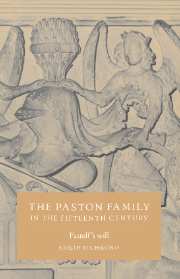6 - Money matters
Published online by Cambridge University Press: 24 December 2009
Summary
It is impossible to give more than an impression of Sir John Paston's financial difficulties between the loss of Caister in 1469 and his death ten years later. It was a decade of debts. If the definition of a gentleman is that he always has creditors then Sir John was a gentleman. That much is clear. Beyond that all is murky for the simple reason that what has survived are private letters not financial documents. Some measure of the scale of Sir John's problems may finally be discerned; the number of pounds and pence he borrowed, however, may only be estimated. There is, nonetheless, much to be learned from a study of Sir John's efforts to remain as close to solvency as possible. Money is no more everything than bread is, and in the fifteenth century gentlemen cared less about it than do bureaucrats in the twentieth, yet it mattered and mattered a great deal, at any rate between mother and son, as the letters show. It is with Margaret Paston that an entrance into the labyrinth will be made.
After her husband's death in 1466 Margaret was richer than Sir John. There is no need to repeat here what has been said elsewhere about the wealth of the two Paston dowagers, Agnes and Margaret, who during Sir John's lifetime held the choicest Paston estates. Both women were heiresses as well as jointured dowagers – although Margaret does not seem to have been dowered; perhaps that was a sacrifice she made to Paston interests; if it was, then her refusal to lend to her eldest son becomes more understandable.
- Type
- Chapter
- Information
- The Paston Family in the Fifteenth Century , pp. 258 - 269Publisher: Cambridge University PressPrint publication year: 1996



